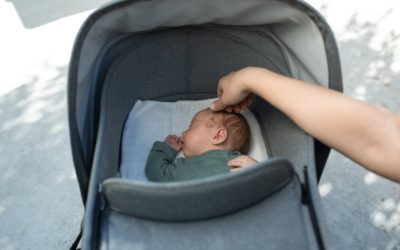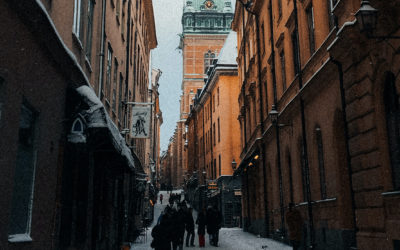- What is air pollution?
- How does it affect our respiratory system?
- Why is air pollution harmful to babies and infants?
- How can bubl help?
Air pollution is nothing new. In fact, people around the world have identified it as a threat since the time of Hippocrates, in around 400 BC. It was in the eighteenth century that we began to develop more scientific ways of identifying and measuring it.
The industrial revolution catalysed air pollution, and highly polluted cities became the focus. The Great Smog of London in 1952 marked a turning point. The disaster, which occurred over five days, caused thousands of deaths and brought London to a near-standstill.
Sky-high levels of industrial pollution and adverse weather conditions combined to form the worst pollution-based fog in the capital’s history. Poor visibility resulted in countless accidents, and pneumonia and bronchitis hospitalisations rose significantly.
Today, air pollution remains a threat to our health and the climate. According to WHO, 99% of us breathe air that exceeds WHO pollution guideline limits. It causes millions of premature deaths every year as a result of acute respiratory infections and other diseases. This is a problem that needs action today, for all of us tomorrow.
What is air pollution?
To understand how air pollution affects our health, we need to know what it’s made of and how it works its way into our bodies.
Air pollution is the term we use to sum up the miniscule particles and gases in the air that can harm us if we breathe them in. Gases like nitrogen dioxide, ozone, sulphur dioxide and carbon monoxide, and particulate matter composed of particles like soot and dust.
These harmful particles are found in a variety of sources, from vehicle exhausts to certain farming practices. Although tiny, they can be inhaled deep into our lungs.
The smaller the particles, the more harmful they are because they’re more able to penetrate deep into the airways. They can even enter the bloodstream before being deposited into other organs, causing local inflammatory responses.
Other common pollution culprits are household combustion devices, industrial facilities like factories and forest fires. Unsurprisingly, pollution is usually worse in large cities, where there’s a larger concentration of emissions from a wider variety of sources.
What does air pollution do to our bodies?
Air pollution can sneak through our body’s defences to enter our respiratory and circulatory systems. Once inside, pollutants can impact a variety of organs. As well as the lungs and respiratory system, it can affect our eyes, nose, throat and the heart.
The most obvious impact is on our breathing. Asthma sufferers are at risk because air pollution can trigger an attack. Other respiratory conditions, such as emphysema, chronic bronchitis and lung cancer are linked to air pollution too.
Now, emerging evidence indicates that air pollution may affect the brain and could be linked to dementia and cognitive decline, and it’s also being associated with Type 2 diabetes.
How does air pollution harm our children?
Younger children and older adults can be more sensitive to air pollution because their immune systems aren’t as robust. Research shows that children growing up in heavily polluted streets have on average a 5% smaller lung capacity than those in cleaner areas.
Dr Ben Barrett of King’s College London, who has led research into how pollution impacts children, told the BBC that children born in more polluted areas face greater challenges. “It’s not necessarily that there’s a particular disease that they develop, but their body is less able to cope with those challenges as they go into adolescence and into old age,” he said.
Emerging evidence also points to a link between an expectant mother’s exposure to air pollution and the risk of their baby being born too early or having a low birth weight, which can lead to a higher risk of lower respiratory infections and other health issues.
It’s important to note that exposure to natural allergens and bacteria is good for your baby’s development. Air pollution isn’t.
We want babybubl. to be used when needed to protect your baby from exposure to air pollution (microparticles). Otherwise, we want children to explore the world and live as healthily as possible. And, in part, that involves exposing them to naturally occuring particles.
What does bubl do for babies and children?
We created bubl to protect the developing lungs of our children. Where other filters and purifiers try to cleanse the room they’re in, they don’t protect the air your baby actually breathes.
Our invention, babybubl, purifies the air that surrounds your baby’s airways in a pram, cot or pushchair, creating a safe bubble of cleansed air around your baby’s head, ensuring that 90% of harmful microparticles are removed from the air they breathe.
It’s a next generation air filtration system that removes allergens and pollutants from the air before trapping them onto a replaceable HEPA filter, and fits into almost every stroller, cot or pushchair available.
It works with a connected app that tracks and measures the air it is purifying, helping you understand your environment and make better decisions for your own health in where you walk.
Find out more about how it works today.
How can we minimise air pollution?
As well as being detrimental to health, air pollution is closely linked to climate change. Fossil fuel combustion is the main offender, and cutting our reliance on it will pave the way for a greener tomorrow while ensuring that future generations grow up with safer, cleaner air.
According to WHO, we could save around one million lives worldwide a year by 2050 by reducing air pollution alone. Simple steps we can take today include:
- Switching to renewable energy
- Taking public transport, cycling or carpooling
- Using environmentally safe cleaning products
- Avoiding burning things
- Cutting down our meat and dairy consumption
Help bubl map air pollution
babybubl has built-in sensors that monitor pollution in real time and feed the information directly to your smartphone app via Bluetooth. If you opt to share your pollution data with bubl, you’ll be helping us to build an accurate picture of air quality worldwide.
Today’s pollution measuring stations don’t give accurate impressions of what people are walking through at ground level. We’re on a mission to counter that. Do your bit for humanity and the environment today – join us in creating a world with better air for everyone.
Become an air champion, and help us improve air quality for all




0 Comments